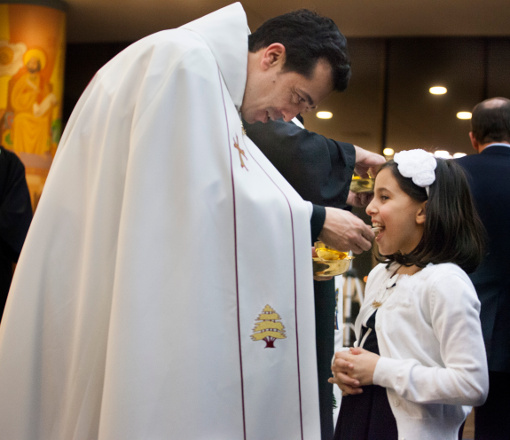
Perla Akiki receives Communion from her father, Fr. Wissam Akiki, after he was ordained to the priesthood Feb. 27 at St. Raymond's Maronite Cathedral in St. Louis. Akiki, who is married with a daughter, is the first married man to be ordained a priest for the U.S. Maronite Catholic Church. (CNS/St. Louis Review/Lisa Johnston)
Fr. Wissam Akiki is the first married man to be ordained a priest for the U.S. Maronite Catholic Church.
On Feb. 27, with permission granted by Pope Francis, Bishop A. Elias Zaidan of the U.S. Maronite Eparchy of Our Lady of Lebanon ordained the married deacon at St. Raymond's Maronite Cathedral in St. Louis.
"It is a blessing and an honor to officiate over any ordination, and especially so at this historic ordination of the first married man to enter the priesthood in the United States of America for the Maronite Church," Zaidan said in a statement issued before the ordination.
"I join our Holy Father, our Maronite patriarch, my fellow bishops and priests throughout the world in our prayer for priestly vocations," he said.
Akiki studied for the priesthood at Holy Spirit University in Lebanon, Our Lady of Lebanon Maronite Seminary in Washington and the Aquinas Institute of Theology in St. Louis. He is married to Manal Kassab and they have a daughter, Perla.
The Maronite Church is among 22 Eastern Catholic churches that are in union with Rome. The spiritual heritage of the Maronite Church is traced to a fourth-century hermit, St. Maron.
These Eastern churches have an ancient tradition of allowing married men to become priests, although since the 1920s the practice generally has not been permitted in the United States, according to a press release from St. Raymond's Cathedral.
St. Raymond's statement also noted that having a married priesthood should in no way "detract from the value that the church finds in the vocation to celibacy. The celibate priesthood continues to be highly esteemed. We need to always keep in mind that it is a vocation to be married and a vocation to be a priest."
In the Latin-rite Catholic Church, including in the United States, celibate priesthood has been the normal practice, explained Msgr. Michael Witt, professor of church history at Kenrick-Glennon Seminary. The Council of Trent, he said, realized that celibacy within the priesthood was a church discipline.
"In other words, the church says that she wants her priests to be celibate so that we priests then stand in for Christ at the altar and also beyond the altar," Witt told the St. Louis Review, newspaper of the St. Louis Archdiocese. "There is a marriage bond between the clergy and the church just as there is a marriage covenant between the church and Christ. And we as priests are supposed to image that."
Eastern Catholic churches traditionally have dealt with the issue of married priests in a different way.
In 692 during the Council of Constantinople, also known as the Council in Trullo, Witt said, the council fathers "acknowledged the legitimacy of a married clergy, but it is highly restricted."
"A (married) priest is not allowed to be a bishop -- in fact most bishops (in the Eastern Church) are monks and they must be celibate. And if you're ordained a priest and you're not married, then you're expected to remain celibate the rest of your life," he explained.
"The important thing to remember about celibacy in Roman Church is that it is a covenantal relationship between the individual priest and the church itself," Witt said. "The priest is standing in for Christ -- the 'alter Christus' -- and he stands in for Christ not only when he is performing the sacraments, but in a much broader sense than that. We are really married to the church in a unique kind of way."
[Jennifer Brinker is a staff writer for the St. Louis Review, newspaper of the Archdiocese of St. Louis.]



